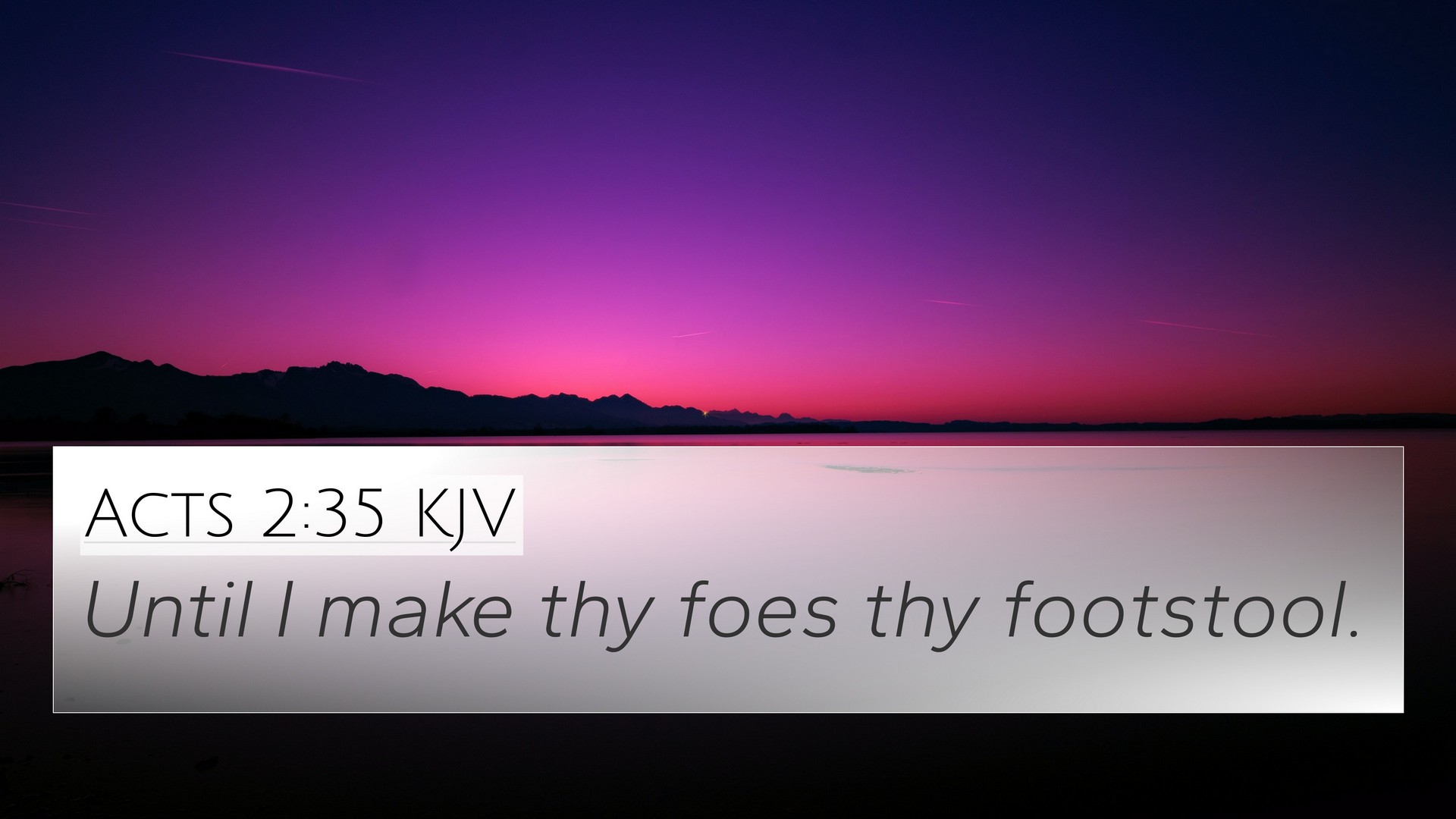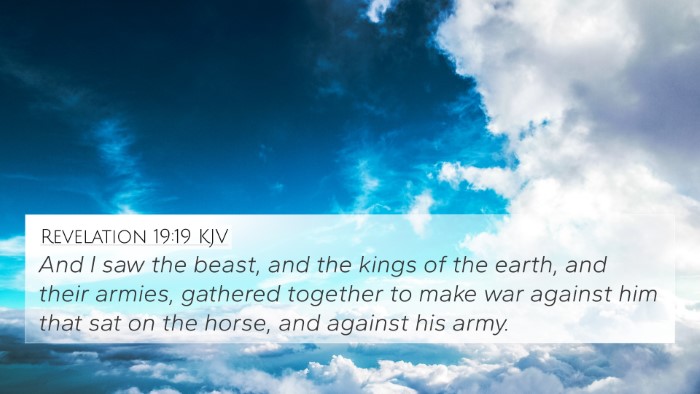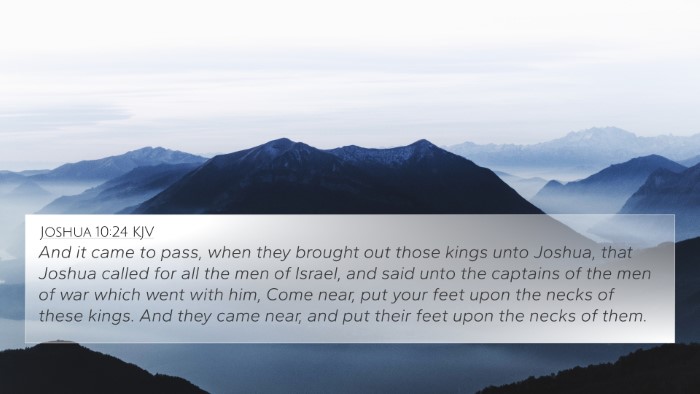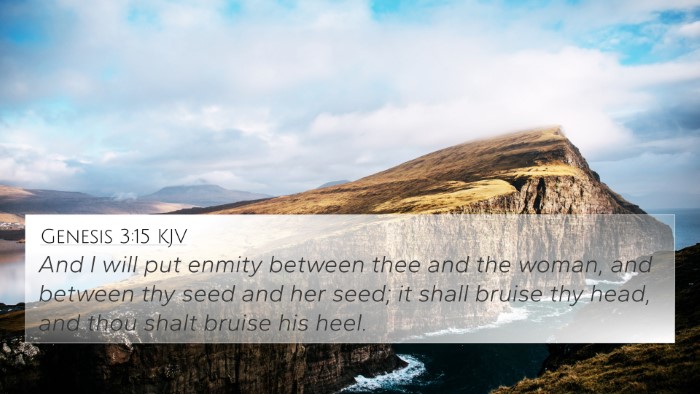Acts 2:35 - Understanding the Verse
Acts 2:35 states: "Until I make your enemies your footstool." This verse, spoken by Peter during the Pentecost, reflects the fulfillment of God's promise regarding the exaltation and sovereignty of Christ. It alludes to Psalm 110:1, where the Lord directs the Messiah's reign and authority over His enemies.
Meaning and Interpretation
This verse is significant as it represents the divine assurance of ultimate victory for Christ. The phrase "make your enemies your footstool" implies complete subjugation and victory over adversaries. Public domain commentaries provide rich insights into this verse:
-
Matthew Henry:
Henry highlights the prophetic nature of this statement, indicating that the reign of Christ will be established despite opposition. God's plan is one of redemption and victory, underscoring the assurance that all that stands against His will shall be defeated.
-
Albert Barnes:
Barnes expounds on the context, noting that this declaration emphasizes the authority granted to Christ. Here, Peter affirms the messianic role of Jesus, who will ultimately reign and have dominion over all creation, establishing a message of hope for believers.
-
Adam Clarke:
Clarke elaborates on the necessity of Christ's enemies being made subject to Him as part of fulfilling prophetic scripture. The "footstool" signifies a place of honor and authority, indicating the revelation of God’s plan through Christ’s ultimate triumph.
Cross-References
Acts 2:35 resonates deeply with several other Scriptures, illustrating the interconnectedness of biblical themes:
- Psalm 110:1: "The LORD says to my Lord, 'Sit at my right hand until I make your enemies your footstool.'
- Hebrews 1:13: "To which of the angels did God ever say, 'Sit at my right hand until I make your enemies a footstool for your feet?'
- 1 Corinthians 15:25: "For he must reign until he has put all his enemies under his feet."
- Philippians 2:10-11: "That at the name of Jesus every knee should bow, in heaven and on earth and under the earth."
- Revelation 19:15: "From his mouth comes a sharp sword with which to strike down the nations, and he will rule them with a rod of iron."
- Romans 16:20: "The God of peace will soon crush Satan under your feet."
- Colossians 2:15: "He disarmed the rulers and authorities and put them to open shame, by triumphing over them in him."
- Ephesians 1:20-22: "That he worked in Christ when he raised him from the dead and seated him at his right hand in the heavenly places, far above all rule and authority and power and dominion."
- Matthew 28:18: "All authority in heaven and on earth has been given to me."
- Romans 14:11: "For it is written, 'As I live, says the Lord, every knee shall bow to me, and every tongue shall confess to God.'
Connections Between Bible Verses
The connections between Acts 2:35 and other Bible verses exemplify the overarching theme of Jesus’ triumph over evil and His established kingdom. These connections highlight themes of authority, victory, and the ultimate subjugation of all opposition to God's will.
Thematic Bible Verse Connections
Examining these verses through a comparative Bible verse analysis reveals the unity in Scripture regarding the messianic prophecy and the exaltation of Christ:
- Victory over enemies
- The establishment of Christ's authority
- The fulfillment of Old Testament prophecies
- Encouragement for believers in the face of adversity
Tools for Bible Cross-Referencing
For those engaged in Bible study, having tools for cross-referencing can greatly enhance understanding and interpretation. Resources such as a bible concordance, bible cross-reference guide, and bible reference resources facilitate an in-depth exploration of verse connections.
Consider these methodologies for effective cross-referencing Bible study:
- Reference Charts: Utilize charts to visualize relationships between verses.
- Verse Mapping: Break down verses and map them to their thematic counterparts.
- Thematic Study: Focus on specific themes, seeking out all relevant verses.
- Contextual Analysis: Study the context in which verses were written to uncover deeper meanings.
Conclusion
Acts 2:35 serves as a powerful reminder of Christ's ultimate triumph over His enemies. Understanding its meanings through public domain commentaries and exploring cross-references enrich our study and deepen our faith. As believers engage with Scripture, the interconnectedness of biblical verses becomes a profound testament to God's faithfulness and sovereignty throughout history.

















